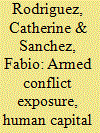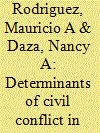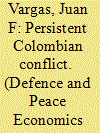| Srl | Item |
| 1 |
ID:
110184


|
|
|
|
|
| Publication |
2012.
|
| Summary/Abstract |
This article estimates the effect of armed conflict exposure on school drop-out and labor decisions of Colombian children between the ages of 6 and 17. The empirical strategy is based on two-stage duration analysis and biprobit estimations that take into account the endogeneity of conflict. We find that conflict affects children older than 11, inducing them to drop out of school and enter the labor market too early. We find that short-term exposure to violence is the most relevant for these decisions and probable channels of transmission include higher mortality risks, negative economic shocks, and lesser school quality.
|
|
|
|
|
|
|
|
|
|
|
|
|
|
|
|
| 2 |
ID:
110181


|
|
|
| 3 |
ID:
110182


|
|
|
|
|
| Publication |
2012.
|
| Summary/Abstract |
We analyze how the determinants of the civil conflict in Colombia at the municipal level respond to changes in the empirical strategy. We estimate several econometric models that vary in three dimensions: 1) the data set, 2) the measure of conflict, and 3) the estimation method. We find substantial differences in the signs and statistical significance of the marginal effects in response to using a different data set, changing the definition of conflict, and employing different empirical methodologies.
|
|
|
|
|
|
|
|
|
|
|
|
|
|
|
|
| 4 |
ID:
110183


|
|
|
|
|
| Publication |
2012.
|
| Summary/Abstract |
Anecdotal evidence suggests that, in stateless regions in Colombia, the establishment of oil palm 1
plantations generates more forced migration than the introduction of coca crops. We provide a theoretical model to study this phenomenon where an agent, allied with the illegal armed group that controls a region, chooses between buying an agricultural good from peasants or producing it himself by evicting farmers from their lands. We compare two crops that differ in their labor intensity. Results indicate that it is more likely that the agent finds it optimal to displace peasants in the case of the less labor intensive crop.
|
|
|
|
|
|
|
|
|
|
|
|
|
|
|
|
| 5 |
ID:
110186


|
|
|
|
|
| Publication |
2012.
|
| Summary/Abstract |
Focusing on the Colombian armed conflict, this paper develops for the first time a within-country analysis of violence duration. It examines a wide range of factors potentially associated with violence duration at the municipal level for the period 1988-2004, including geographic factors, economic and social variables, institutional characteristics, victimization variables and government intervention. It individuates the most robust correlates of the persistence of localized conflict, both across specifications and using different econometric models of duration analysis. Results suggest that violence in Colombia is more persistent in places where illegal rents are available. Better quality institutions and a more active military are in turn associated with shorter conflict episodes.
|
|
|
|
|
|
|
|
|
|
|
|
|
|
|
|
| 6 |
ID:
110185


|
|
|
|
|
| Publication |
2012.
|
| Summary/Abstract |
We study the causal effect of recent landmark events of the Colombian armed conflict on the foreign perception of sovereign risk, as measured by the price of the Credit Default Swap (CDS) of Colombian bonds. We construct a Synthetic Control Group to use as the non-conflict counterfactual of the Colombian CDS price and compare its behavior around relevant conflict-event dates with that of the actual (conflict-affected) Colombian CDS. Results suggest that the impact of conflict on the foreign perception of sovereign risk is sizable but rather idiosyncratic, and depends on the political context surrounding each event.
|
|
|
|
|
|
|
|
|
|
|
|
|
|
|
|